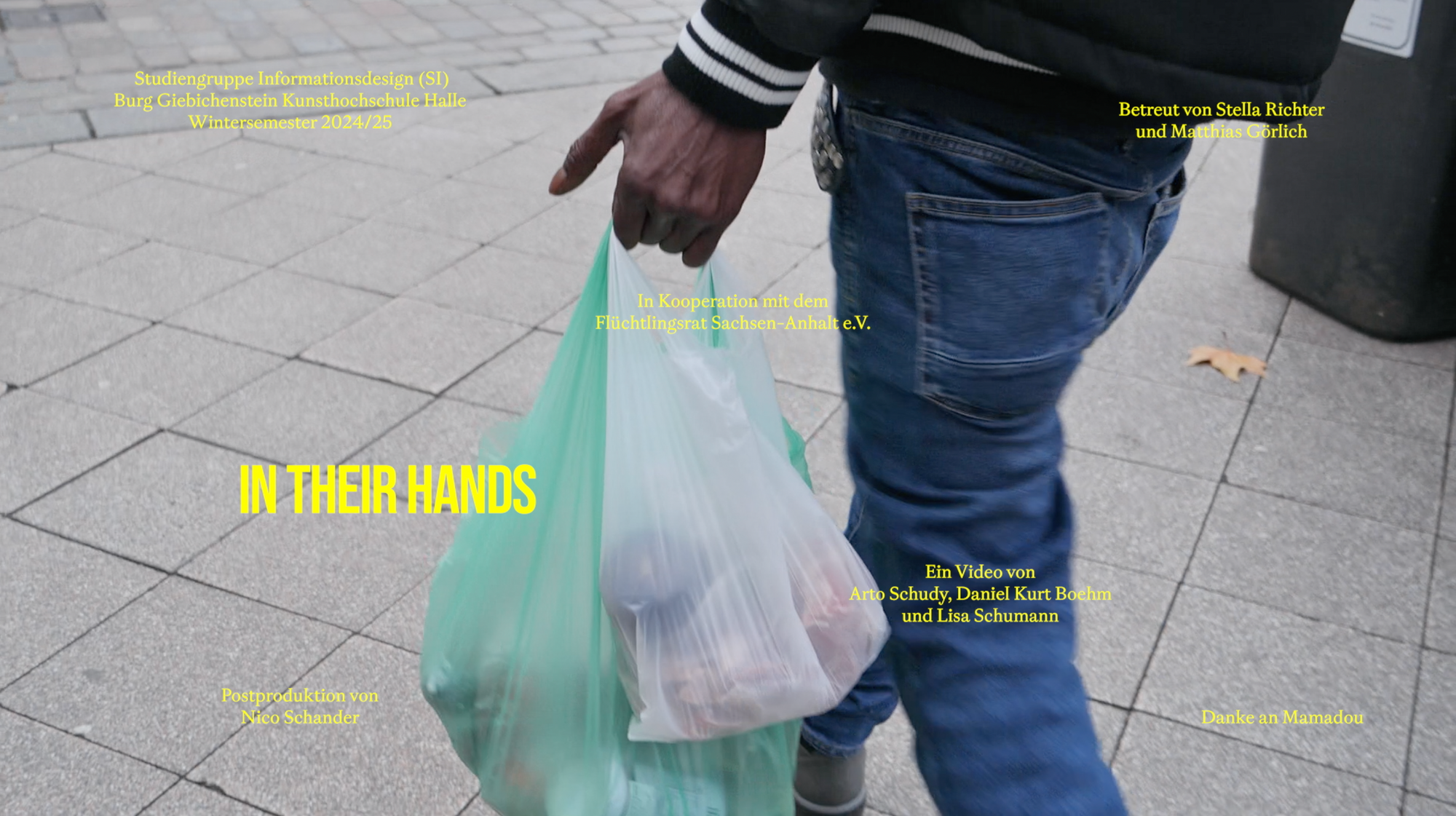
ASPECTS
anti-discrimination, space, migration, violence, critical-practice, common, antiracist, visual-activism, human-rights, collaboration, protest, storytelling, anti-right, exhibition, politics, surveillance
TEAM
Arto Schudy, Daniel Boehm, Lisa Schumann
PARTNERS
YEAR
2024-25
ABTRACT
"In Their Hands" Short Film - Vimeo
Bundestag Speeches - Vimeo
Die Bezahlkarte wird seit Ende 2024 in flächendeckend in allen deutschen Bundesländern eingeführt. Sozialleistungen für geflüchtete Menschen, die oft jahrelang auf ihre Asylentscheidung und Arbeitsfreiheit warten, werden dadurch nicht mehr als Bargeld, sondern als Guthaben auf einer Prepaid-Karte ausgezahlt. Die Bezahlkarte bevormundet und entwürdigt Menschen, da sie mit dem Guthaben auf der Karte nur in Geschäften einkaufen können, die Visa-Zahlungen akzeptieren. Einige Bundesländer verwenden "Blacklists" um rassistisch-stereotypisierte Nutzungen, wie Glücksspiel zu unterbinden, und einige Kommunen in Sachsen-Anhalt und Bayern machen Gebrauch von einer Postleitzahlgebiet-Restriktion, und führen somit de facto eine Residenzpflicht für Geflüchtete ein. Die Bargeldabhebung wird auf 50 Euro im Monat beschränkt; dadurch wird die Selbstbestimmung, soziale Teilhabe und Mobilität geflüchteter Menschen beschnitten, weil alltägliche Dinge wie Einkäufe auf dem Markt oder Bargeld für den Schulausflug nicht möglich sind. Auch Überweisungen sind mit der Bezahlkarte nicht frei möglich, da sie einzeln von den Sozialämtern freigegeben werden, um vermeintliche Überweisungen an Schlepper oder Familien in Herkunftsländern zu verhindern. Die dahinterstehende rassistische Ideologie zielt darauf ab, geflüchtete Menschen einzuschränken und vor der Migration nach Deutschland abzuschrecken.
Mit unserem multimedialen Projekt wollen wir einen Beitrag dazu leisten, Empathie für das Leid Geflüchteter zu wecken und über die Repression durch die Bezahlkarte in Deutschland zu informieren und sie zu problematisieren. Dafür haben wir Mamadou dokumentarisch begleitet, der seit Beginn der Pilotphase in Sachsen-Anhalt die Bezahlkarte nutzen muss, und über seine Einschränkungen durch sie und seinen Status als Asylsuchender berichtet. Neben dem Kurzfilm ordnet unser Interview-Flyer mit dem Flüchtlingsrat Sachsen-Anhalt die Bezahlkarte politisch aus der Perspektive zivilgesellschaftlichen Gegen-Engagements ein. Ton-Ausschnitte aus Bundestagsreden vom 12. April 2024, dem Tag der Abstimmung über die Bezahlkarte, offenbaren die rassistische Ideologie und Vorurteile, die der politischen Entscheidung für die Bezahlkarte zugrunde liegen.
Unser Projekt wurde vom 4. bis 13. April 2025 im Bedürfnis e.V. in Halle ausgestellt.
EN
The Bezahlkarte (SocialCard) is being introduced across all German federal states since the end of 2024. Social benefits for refugees, who frequently wait years for their asylum decision and labour freedom, are no longer paid out as cash but as credit on a prepaid card. The Bezahlkarte patronises and degrades people, as they can only use the credit on the card in shops that accept Visa payments. Some federal states use ‘blacklists’ to prevent racially stereotyped uses, such as gambling, and some municipalities in Saxony-Anhalt and Bavaria make use of a postcode area restriction, thus introducing a de facto residence obligation for refugees.Cash withdrawals are limited to 50 euros per month; this restricts the self-determination, social participation and mobility of refugees because everyday things such as shopping at the market or having cash for school trips are not possible. Even bank transfers are not freely possible with the Bezahlkarte, as they are authorised individually by the social welfare offices in order to prevent alleged transfers to smugglers or families in countries of origin. The racist ideology behind this is aimed at restricting refugees and deterring them from migrating to Germany.
With our multimedial project, we want to make a contribution to raising empathy for the suffering of refugees and to inform people about and problematise the repression caused by the Bezahlkarte in Germany. We therefore accompanied Mamadou, who has been obliged to use the Bezahlkarte since the start of the pilot phase in Saxony-Anhalt, and who reports about the restrictions it imposes on him as well as his general status as an asylum seeker. In addition to the short film, our interview flyer with the Flüchtlingsrat Sachsen-Anhalt places the Bezahlkarte in a political context from the perspective of civil society counter-engagement. Audio excerpts from Bundestag speeches from 12 April 2024, the day of the vote on the Bezahlkarte, reveal the racist ideology and prejudices underlying the political decision for the Bezahlkarte.
Our project was exhibited at Bedürfnis e.V. in Halle from 4 to 13 April 2025.